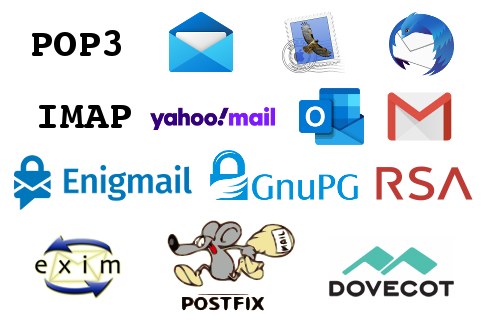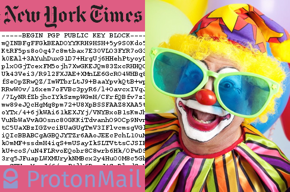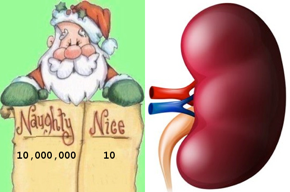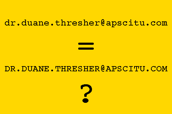
Email Technology
Hundreds of millions of Americans, including those in government, business, and the media (particularly IT writers), have used email almost every day for many years and yet have no idea how it actually works, thus making themselves extremely vulnerable to hackers, including the National Security Agency (NSA).
The Expert Email News articles and blurbs below contain explanations of email technology, often in the illuminating context of email news.
All will explain why Apscitu Mail is the best and you should trash the rest.

Incompetent Encryption Is Worse Than No Encryption
By Duane Thresher, Ph.D. August 17, 2020
When you think of email security, you probably think of encryption. This is not the most important aspect of email security — your email server is, see About Apscitu Mail — but email encryption can add another layer of security, which is generally good. You might not use email encryption because you think the NSA, and more competent hackers, can break the encryption, but you are wrong; see No, The NSA Does Not Have Encryption-Breaking Quantum Computers. Or you might not use email encryption because it seems too complicated to use. In that case, you are right. Studies show that even the most user-friendly email encryption system is too difficult for even above-average users to use competently. And incompetent encryption is worse than no encryption because you are lulled into a false sense of security and insecurely send more, and more sensitive, data than you would otherwise. You might go looking around for some one-size-fits-all solution to your email encryption, particularly if you are someone like a whistleblower trying to contact the media, or vice versa, but you would be wrong then too. Your getting competent email encryption requires an IT expert working closely with you, i.e. custom work, like with Apscitu Mail. In that case, you would be right.

Your Friends Get By (Google) With A Little Help From You
By Duane Thresher, Ph.D. February 1, 2020
Recently I was doing business with a company that I discovered was unknowingly losing customers due to Google's spam filter. Like many businesses, and government and universities, the company used Google Mail (see Google: Invasion of the Email Snatchers). Gmail was automatically sending customers' emails to the spam folder, which they rarely if ever checked — and Gmail spam is automatically deleted after 30 days — or was rejecting customers' emails outright, without notifying the company (see Whitelists, Blacklists, and the Great Spam Filter Scam).
So the company was losing customers without even knowing it. Losing customers is literally money out of the company's pockets. This is every company's nightmare. They spend a small fortune on advertising (including to Google) and when it works, the acquired customers are ignored (by Google).

Biggest Turnoff: Gmail Spam Filter
By Duane Thresher, Ph.D. June 27, 2019
I mentioned Google Mail's (Gmail's) spam filter in Whitelists, Blacklists, and the Great Spam Filter Scam, particularly how it reads your emails and censors them based on content and probably sender too. As discussed in Google: Invasion of the Email Snatchers, most have surrendered their email to Big Brother Google and think they have to do email however Google says, including using its spam filter. You can actually turn off the Gmail spam filter, although Google tries to hide and discourage this, and until you get Apscitu Mail, this turnoff is the biggest thing you can do to protect yourself.
When you get a Gmail account, the spam filter is on by default, with no option given to turn it off. Whenever Google deems an email you receive to be spam, including because its content is politically incorrect or because it was sent from a rival email service provider, it gets sent to the Gmail spam folder.

Whitelists, Blacklists, and the Great Spam Filter Scam
By Duane Thresher, Ph.D. June 15, 2019
Spam is unwanted email and is often dangerous and offensive. Dangerous because it is a leading hacking method (e.g. phishing) and offensive because it often involves porn. Spam has become such a big problem that many people have drastically reduced or even stopped using email. This is an incredible waste since email is the best form of communication — you can inexpensively and instantly send large amounts of text, documents, photos, audio, and video at any time and it can all be sent securely. Spam filtering is used to address the problem but the most common methods — because they are the most profitable to the companies that produce them — are frustratingly bad, often causing the loss of important wanted emails while still allowing dangerous and offensive spam. There is a simple, free, highly effective spam filtering method, whitelists, but spam filter producers and email service providers don't want you to use them because they are free and highly effective.

Do Capitals In Email Addresses Make Any Difference?
May 29, 2019Mostly you see email addresses that have no capital letters, but you may have seen email addresses that were all caps or mixed caps and small letters. You may have wondered whether you can use caps yourself when giving out your own email address, perhaps to emphasize some part of it or indicate the start of individual words in a multi-word address. In more technical terms, you wondered whether email addresses are "case-sensitive".
The answer is caps shouldn't make any difference, but given the plague of IT incompetence there may be some bad programming along the way that results in caps causing problems and emails not reaching their destinations.
